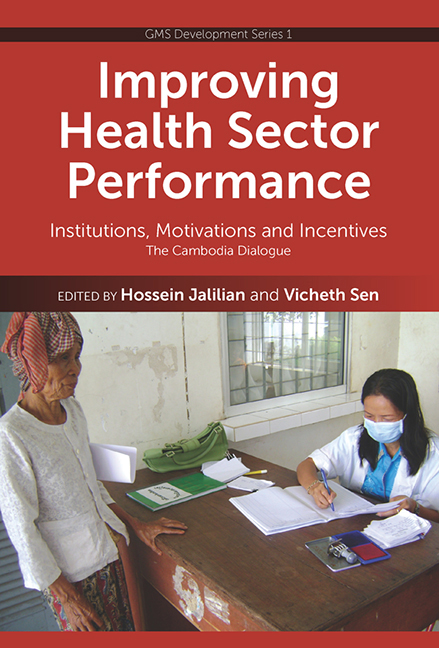 Improving Health Sector Performance
Improving Health Sector Performance Book contents
- Frontmatter
- Contents
- Acknowledgements
- Foreword
- List of Contributors
- Introduction
- Part I Overview
- Part II Organizational Arrangements: Purchasing Health Services
- Part III Optimal Health Workers Contracts
- Part IV Managing Doctors and Nurses
- Part V Health Service Consumer Behaviour
- 14 Factors Influencing Health-Seeking Behaviour in Siem Reap: A Qualitative Analysis
- 15 Villagers’ Evaluation of a Community-based Health Insurance Scheme in Thmar Pouk, Cambodia
- APPENDIX
- Index
14 - Factors Influencing Health-Seeking Behaviour in Siem Reap: A Qualitative Analysis
from Part V - Health Service Consumer Behaviour
Published online by Cambridge University Press: 21 October 2015
- Frontmatter
- Contents
- Acknowledgements
- Foreword
- List of Contributors
- Introduction
- Part I Overview
- Part II Organizational Arrangements: Purchasing Health Services
- Part III Optimal Health Workers Contracts
- Part IV Managing Doctors and Nurses
- Part V Health Service Consumer Behaviour
- 14 Factors Influencing Health-Seeking Behaviour in Siem Reap: A Qualitative Analysis
- 15 Villagers’ Evaluation of a Community-based Health Insurance Scheme in Thmar Pouk, Cambodia
- APPENDIX
- Index
Summary
INTRODUCTION
Following more than thirty years of civil war, the genocidal regime of the Khmer Rouge, and global isolation, Cambodia has made a notable movement forward in political, economic, and social development. However, it remains one of the poorest countries in the region, with 35 per cent of the population living below the poverty line (United Nations Development Programme 2009). In spite of investment in the health system, indicators remain poor. According to the 2005 Cambodian Demographic and Health Survey, the maternal mortality ratio is 472 per 100,000, and the infant mortality rate is 66 per 1,000 live births (National Institute of Public Health et al. 2005).
In 1997, the Ministry of Health permitted public health facilities to collect user fees. These fees are used to provide staff incentives, as well as to contribute towards operational costs of the facilities (Annear et al. 2008). Much of the literature on the implications of the user fee system on service utilization has argued that user fees negatively impact families’, particularly poor families’, ability to access services (Jacobs & Price 2004; Jacobs & Price 2006; Jacobs et al. 2007). Very little research has been conducted on treatment-seeking decision making beyond the financial component. One study of dengue-related health-seeking behaviours was conducted in rural Cambodia. This found that biomedical and traditional treatments were sought not solely due to financial accessibility, but also to perceptions of quality of services (Khun & Manderson 2007).
However, an econo-centric approach tends to exclude the more complex factors that affect decision making. Because “illness and care seeking are socially and culturally embedded” (Garro 1998, p. 330), comprehensive understanding of these processes demands an exploration of sociocultural elements. Therefore, utilizing dengue as an example, this chapter seeks to determine what considerations beyond the financial influence a family's decision to seek care for suspected dengue infection. How is dengue locally understood, and what role does this knowledge have in treatment seeking? What type of dengue health education is conducted, and what is its function in decision making? When the decision to seek care is made, what services are accessed?
Dengue is the most widespread vector-borne virus in the world, with approximately 2.5 billion people living in areas of high risk.
- Type
- Chapter
- Information
- Improving Health Sector PerformanceInstitutions, Motivations and Incentives - The Cambodia Dialogue, pp. 353 - 364Publisher: ISEAS–Yusof Ishak InstitutePrint publication year: 2011
